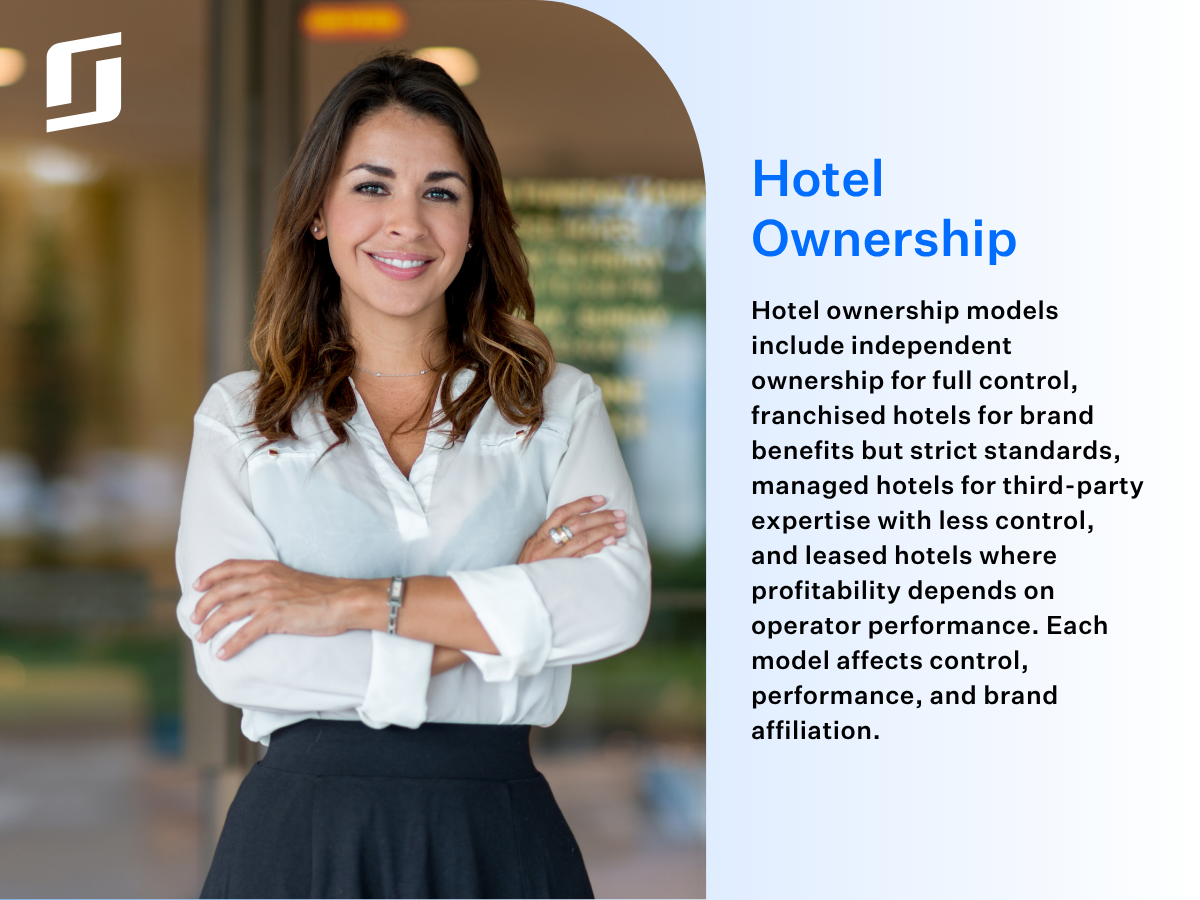What is hotel ownership?
Hotel ownership describes the legal and financial responsibility of owning a hotel business, including the land, the property, and all its fixtures and equipment.
A hotel owner is responsible for overseeing the overall performance and profitability of the property. Their duties can include managing finances, setting strategic goals, maintaining the building and facilities, ensuring compliance with regulations, and deciding on staffing or management structures.
While some hotel owners are hands-on, others hire management companies to run hotel departments and daily operations, focusing instead on investment decisions, brand partnerships and long-term growth. Ultimately, the owner’s role is to ensure the hotel remains well-maintained and profitable.
In this blog, we will drill down on hotel ownership to understand different ownership structures, how to choose the right one for your situation, and the tools that will help your hotel venture succeed.
Table of contents
Why choosing the right hotel ownership model matters
Choosing the right hotel ownership model is crucial because it directly affects the financial returns, operational responsibilities, level of control and long-term success of your hotel business.
The model you choose determines how much risk you take on, how involved you need to be in daily operations, and how much support you receive from external partners.
An independent hotel grants you full control over the business but requires significant investment and experience. A leased ownership model, meanwhile, sees you act as nothing more than a hotel landlord, where you enjoy a steady income with zero operational involvement and minimal risk. The downside is you won’t enjoy any extra reward.
Aligning your ownership structure with your goals, resources and risk appetite is key to building a sustainable and profitable hotel business.
Types of hotel ownership
There are a number of different types of hotel ownership models, and each comes with its own pros and cons.
Independent hotel ownership
Independently owned hotels aren’t affiliated with a major brand or chain. As the owner (or as part of the hotel ownership group), you have complete control over decision-making, from branding to operations, which gives you the ability to offer a truly unique guest experience. On the flipside, an independent owner takes on all financial and operational risk.
Franchised hotel ownership
Franchised hotels are operated under a recognised brand name and use the franchisor’s systems, standards and marketing. As the hotel owner, you pay fees and royalties in exchange for the benefits of brand recognition and support. You retain day-to-day control of the property, but don’t have the creative and decision-making freedom of an independent owner.
Leased hotel ownership
Leased hotel ownership sees you lease your property to an operator or brand, who runs the hotel for you and assumes all operational responsibility. As the owner, you earn a fixed rental income, while the operator manages the business, earns the profits and takes on the business risk. The owner simply acts as a landlord and is completely hands-off.
Managed hotel ownership
Managed hotel ownership is when you, the property owner, hire a professional hotel management company to operate the hotel on your behalf. The management provider handles staffing, operations and guest services, while you are more hands-off. You still ultimately take on the risk, but you receive a share of the profits as a reward.
Fractional hotel ownership
Fractional hotel ownership allows multiple individuals to co-own a share of a hotel or resort property. A famous case is ‘timeshare’, where each owner is entitled to use the property for a set period each year and shares in any rental income or appreciation: a sort of hybrid of real estate investment and lifestyle purchase. But there are also non-timeshare hotel ownership groups made up of large numbers of fractional investors – a situation that can be more comparable to buying shares in a publicly traded company.
Your situation may limit which of these ownership options are available to you, and channel you toward a specific form of ownership.

Choosing the right hotel ownership and management structure
How do you choose the right hotel ownership and management structure for your situation? By factoring in some key considerations, you can start to identify which of the ownership models listed above is right for you.
Long-term vision
Your long-term goals will have an outsized influence on the best hotel ownership model for you. If you envision building a unique brand and enjoying complete creative freedom, independent ownership is best, as it grants you full control over branding and operations.
But if your goal is to scale or build a property portfolio quickly, franchising or management agreements may get you where you want to go sooner. An investor wanting to grow nationally might choose a franchised model for its brand power and systems, even if it means they must adhere to strict brand standards.
Available capital
The amount of capital you can invest upfront will play a key role in your ownership decision.
Independent hotels typically require more capital for branding, systems and marketing, while franchised or managed hotels can offset some of these costs through access to established infrastructure and customer bases. Fractional owners, meanwhile, can often invest as much or as little as they choose.
An investor with limited funds might prefer a franchise for the support it provides, but they’ll need to factor in ongoing fees.
Operational capacity
Owning a hotel and managing a hotel are two very different things. You need to decide how hands-on you’re prepared to be in terms of operations.
If you have hospitality experience and a strong management team, you may be able to handle the day-to-day operational rigours of independent or franchised ownership.
But if you lack the time, expertise or desire to be that hands-on, a fractional, managed or leased hotel ownership model could be more suitable. A busy entrepreneur, for example, might prefer to hire a management company that allows them to trade daily involvement for a more passive role.
Risk tolerance
Different ownership structures come with varying degrees of financial and operational risk.
Independent owners face the highest risk, but also have the potential for the highest reward, and enjoy unmatched levels of creative and decision-making freedom.
Those with lower risk tolerance might prefer hiring a hotel management company or leasing a hotel to an operator and receiving predictable rental income regardless of performance.
Similarly, franchises provide support systems that can reduce operational risk, though they come with binding contracts and ongoing obligations.
Level of control
Consider how much control you want over the hotel’s design, policies and branding.
If you’d like full decision-making authority, independent ownership is ideal. If you’re comfortable giving up some control in exchange for support, franchising allows you to retain ownership while following brand standards.
For those willing to step back completely, management agreements or leasing will pass control to another party, which will limit your influence over the hotel.
Hotel ownership: Tools for growth
If you plan to take a more hands-on approach to hotel ownership – particularly as an independent owner – you’ll need tools to help you efficiently and effectively manage your hotel business.
A complete hotel software solution will have all the tools you need to grow your business. A few of the most important include:
- Channel manager: A tool that synchronises room availability and rates across multiple OTA listings in real time.
- Global distribution system: A tool that connects you to the booking systems used by travel agents and corporate travellers, like Sabre, Amadeus and Travelport.
- Guest engagement: A set of features designed to enhance communication and personalise the guest experience before, during and after a stay.
- Hotel booking engine: An online tool integrated into the hotel’s website that allows guests to check availability and make direct bookings.
One solution that offers all of the above, and a whole lot more, is SiteMinder.
As the world’s largest open hotel commerce platform, SiteMinder empowers hotel owners to gain control over the success of their properties, at whatever level they require, from granular day-to-day operations to long-term and strategic decision-making.


